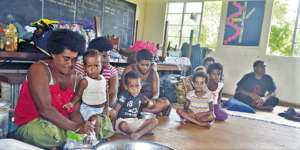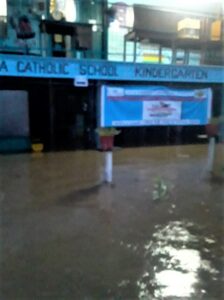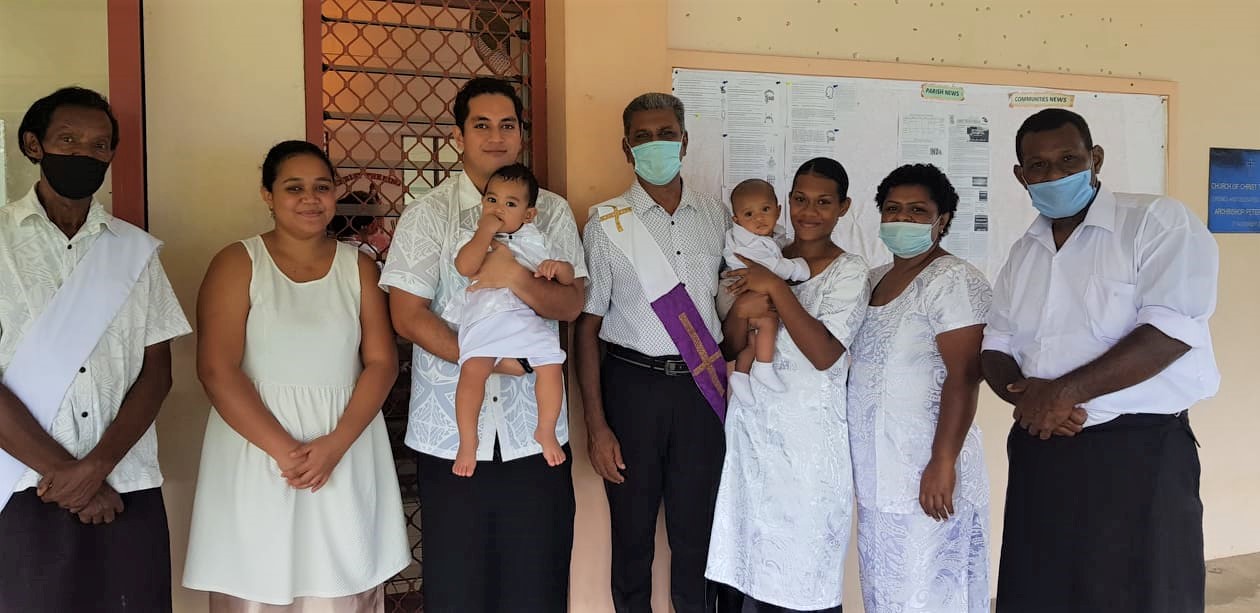Cancelling Masses and sacramental services in favour of direct aid to flood evacuees – is this the ‘new normal’ for a priest on Sundays in the Pacific, asks Columban missionary Fr Pat Colgan.
Heavy rain began in Ba on the night of 4-5 February. It continued right through Saturday and on/off on Sunday until about midday. The town was inundated. Somehow, we were able to celebrate Mass in the parish church at 7.30am on Sunday morning and even conducted two baptisms!
I cancelled my other two scheduled Masses for that Sunday, knowing that both villages were impassable. So instead, a number of us went to visit our parishioners whom we knew were in three schools-cum-evacuation centres.
In one school, we had 10 parishioners with their catechist from Nadrugu Village, who had chosen to keep selling their produce in the market on Saturday, despite seeing the bad weather coming. Their weekly trip to the market is their main source of income, and with schools opening this week after a one-year hiatus, they were willing to take the risk, needing money for their children’s stationery, uniforms etc.

Family sheltering in a classroom.
We had given these people tea and shelter in the basement of the presbytery on Saturday until the police opened an evacuation centre, where we then brought them. The place was already full of people from a neighbouring parish who had also chosen to keep selling their produce on Saturday, and then couldn’t get home.
As we visited, we noticed that most were already leaving, because the government had ordered the clearing of all schools in preparation for the resumption of classes and exams on Monday. This directive was changed later in the day, and schools remained closed because of the uncertain weather.
The parishioners of Ba seemed to have no money for transport, so I took them to a house in Vunisamaloa (about 6kms out of town) through two quite deep floods on the main Ba to Navala road.
As regards the second school, there were about 40 people there from the village of Votua, which is well known for flooding. We lent them a two-burner stove, gas, and two cartons of biscuits. They eventually left at 2pm, going back home in a combination of boats and a large police truck.

Votua Catholic School acting as an Evacuation Centre, Sat 5th Feb 2022.
Another small group were sheltering at Namosau Methodist School to whom we donated rations from our cupboards.
The situation in Votua village was, as usual, quite dire. There were 59 evacuees (14 families) sheltered at the primary school on Saturday night through to Sunday. By Sunday afternoon, the ground-level kindergarten was finally cleaned, and all the evacuees were able to go home. Luckily, power and water supply remained in most parts of Ba over the two days.
I have had a number of Sundays like this recently in Ba, having to cancel Masses and sacramental services, in favour of direct aid to flood evacuees. It is challenging my idea of what a priest’s ‘major’ job on Sunday should be – say Mass or get my hands wet and dirty helping others?
Maybe there isn’t a contradiction? (I’m still trying to figure it out). The evacuees in the second school talked of how touched they were when the Hindu teachers there dropped their cleaning of classrooms in preparation for Monday, to start cooking food for their almost 100 ‘guests’.
Perhaps those teachers ‘did’ Sunday in a way that was very pleasing to God – theirs and ours?
Support Columban mission in Fiji by donating online here: https://columbans.ie/donate/

